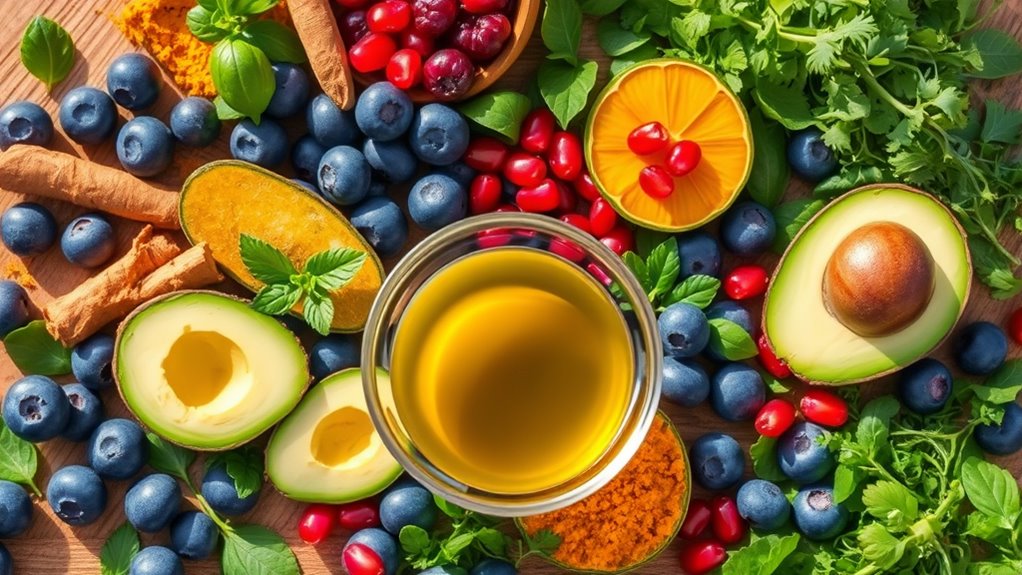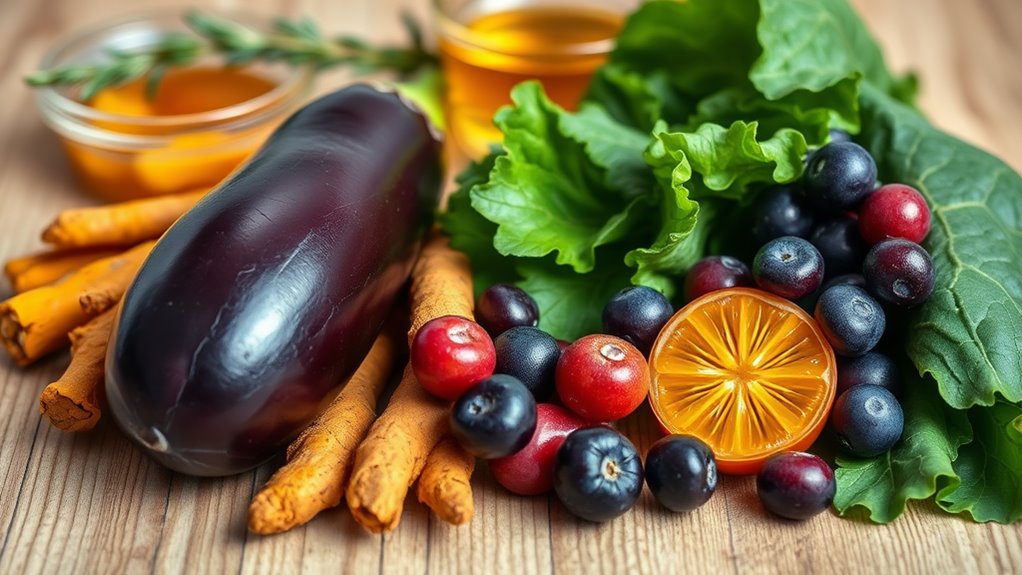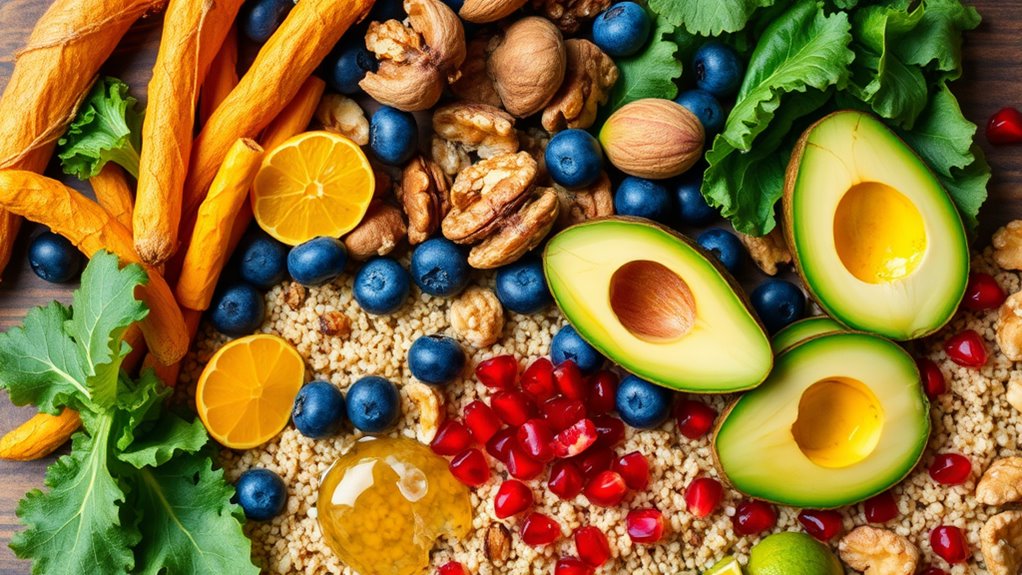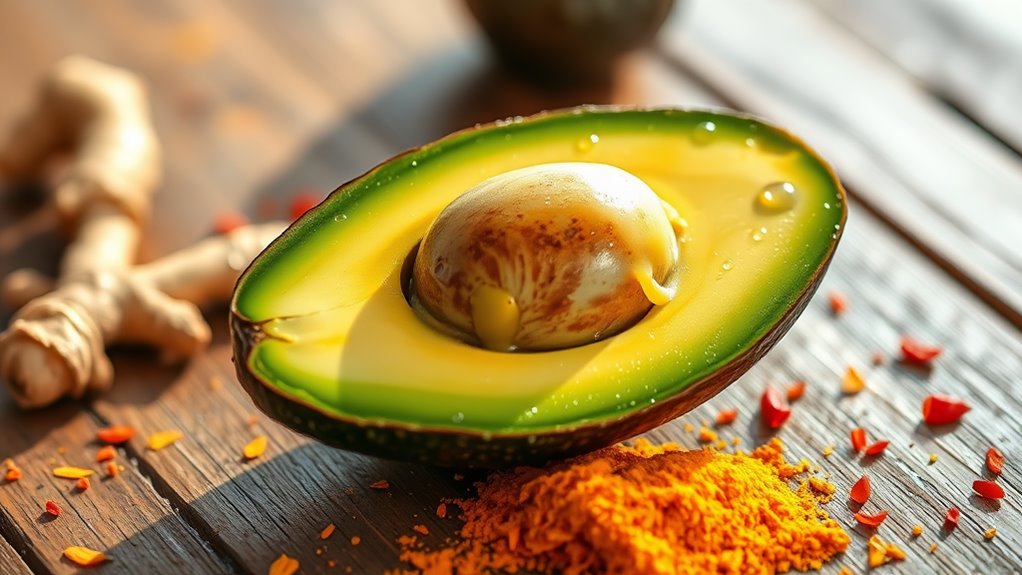Anti-Inflammatory Foods That’ll Make You Feel 10 Years Younger!
Incorporating anti-inflammatory foods into your diet can make you feel ten years younger! Start with antioxidant-rich berries and nutrient-dense leafy greens. Don’t forget fatty fish for heart and brain health, along with fiber-filled nuts and whole grains. Drizzle some olive oil on meals for added benefits, and enjoy avocados for creamy goodness. Finally, indulge in dark chocolate for its delicious anti-inflammatory effects. Discover even more about these vibrant foods that’ll energize your body!
The Power of Berries: Nature’s Antioxidant Bombs
Berries are truly nature’s antioxidant bombs, packing a powerful punch against inflammation. When you munch on blueberries, strawberries, or raspberries, you’re not just enjoying a tasty snack; you’re fueling your body with essential nutrients.
These little fruits are loaded with vitamins and antioxidants like anthocyanins, which help combat oxidative stress and reduce chronic inflammation. Plus, their low glycemic index means they won’t spike your blood sugar, making them a smart choice for maintaining energy levels.
Incorporating berries into your daily routine is simple—throw them in smoothies, atop your yogurt, or enjoy them on their own. By embracing these vibrant gems, you’re taking a delicious step toward a healthier, more youthful you.
Leafy Greens: Nutrient-Dense Superstars
After enjoying a handful of berries, consider adding leafy greens to your plate.
These nutrient-dense superstars, like spinach, kale, and Swiss chard, pack a powerful punch of vitamins, minerals, and antioxidants. They’re rich in vitamins A, C, and K, which help reduce inflammation and support overall health.
The fiber in leafy greens also promotes a healthy gut, aiding digestion and keeping you feeling energized. Plus, they’re low in calories, making them an excellent choice for any meal.
Toss them into salads, blend them into smoothies, or sauté them as a side dish. By incorporating leafy greens into your diet, you’re not just boosting your nutrient intake; you’re investing in a younger, healthier you.
Fatty Fish: Omega-3s for Heart and Brain Health
When you think about foods that fight inflammation, don’t overlook fatty fish like salmon, mackerel, and sardines.
These fish are rich in omega-3 fatty acids, which are essential for heart and brain health. Omega-3s help reduce inflammation throughout your body, lowering the risk of chronic diseases.
By incorporating fatty fish into your diet, you’re not just boosting your heart health; you’re also supporting cognitive function and mental clarity. Aim for at least two servings a week to reap the benefits.
Whether grilled, baked, or added to a salad, these delicious fish options can make a significant difference in how you feel.
Nuts and Seeds: Small But Mighty
Nuts and seeds may be small, but they pack a powerful punch when it comes to fighting inflammation. Incorporating a variety of these nutrient-dense foods into your diet can help reduce inflammation and improve overall health. Here’s a quick look at some of the best options:
| Nuts/Seeds | Benefits |
|---|---|
| Walnuts | High in omega-3 fatty acids |
| Almonds | Rich in vitamin E, an antioxidant |
| Chia Seeds | Packed with fiber and omega-3s |
| Flaxseeds | Great source of lignans |
Adding these crunchy snacks to your meals or enjoying them as a snack can enhance your well-being. So go ahead, sprinkle them on your salads or blend them into smoothies!
Whole Grains: Fiber-Rich Fuel for Your Body
Incorporating a variety of whole grains into your diet can complement the benefits of nuts and seeds by providing additional fiber and nutrients that help combat inflammation.
Whole grains like quinoa, brown rice, and barley are rich in antioxidants, vitamins, and minerals, which can enhance your overall health. They help maintain stable blood sugar levels, reducing the risk of chronic inflammation.
You’ll also find that the fiber in whole grains supports healthy digestion and keeps you feeling full longer, making it easier to manage your weight.
By swapping refined grains for whole grains, you’re not just fueling your body; you’re actively working toward a healthier lifestyle.
Embrace the versatility of whole grains and watch your energy levels soar!
Turmeric: the Golden Spice With Healing Properties
Turmeric, often hailed as the golden spice, boasts powerful anti-inflammatory properties that can significantly benefit your health. This vibrant yellow root contains curcumin, a compound known for its ability to reduce inflammation and fight oxidative stress.
Incorporating turmeric into your diet is simple; you can add it to smoothies, soups, or even sprinkle it on roasted vegetables. Not only does turmeric enhance flavor, but it also supports joint health and may help alleviate symptoms of arthritis.
Plus, its antioxidant properties can boost your immune system, making you feel more energetic. You might also consider pairing it with black pepper, which enhances curcumin absorption. Embrace this spice and watch as it contributes to your overall well-being!
Olive Oil: The Mediterranean Elixir
Although you might think of olive oil as just a cooking staple, it’s actually a powerhouse of anti-inflammatory benefits.
Rich in monounsaturated fats and antioxidants, it can help reduce inflammation in your body, promoting better overall health. When you drizzle extra virgin olive oil over your salads or use it for sautéing, you’re not just enhancing flavor; you’re also providing your body with oleocanthal, a compound known to have similar effects to ibuprofen in lowering inflammation.
Incorporating olive oil into your diet may also support heart health and improve cholesterol levels.
Garlic: A Flavorful Immunity Booster
Garlic isn’t just a flavorful addition to your meals; it’s also a robust ally in boosting your immunity and fighting inflammation. Packed with antioxidants, garlic helps your body fend off illness and supports overall health. Its active compound, allicin, is known for its antibacterial and antiviral properties, making it a perfect addition to your diet.
Here’s a quick breakdown of garlic’s benefits:
| Benefit | Effect on Health | Best Way to Consume |
|---|---|---|
| Boosts Immunity | Enhances white blood cells | Raw or lightly cooked |
| Reduces Inflammation | Lowers inflammatory markers | Added to dishes |
| Heart Health | Lowers cholesterol levels | In soups and sauces |
| Antioxidant Properties | Fights free radicals | As a seasoning |
| Digestive Support | Aids in gut health | In marinades |
Incorporate garlic into your meals, and feel the difference!
Avocado: Creamy Goodness Packed With Nutrients
Avocado is a creamy delight that’s not only delicious but also brimming with essential nutrients. Packed with healthy monounsaturated fats, it helps lower bad cholesterol and supports heart health.
You’ll also find plenty of vitamins, including E, K, and several B vitamins, which play a crucial role in reducing inflammation and boosting your immune system. Plus, avocados are rich in potassium, aiding in maintaining healthy blood pressure levels.
Whether you spread it on toast, toss it in a salad, or blend it into a smoothie, this versatile fruit can elevate your meals while providing numerous health benefits.
Incorporating avocado into your diet is an easy way to feel rejuvenated and support your overall well-being. Enjoy its creamy goodness!
Dark Chocolate: A Delicious Way to Fight Inflammation
When you think of indulgent treats, dark chocolate mightn’t be the first thing that comes to mind for fighting inflammation. However, this rich delight is packed with antioxidants that can actually help reduce inflammation in your body.
By enjoying dark chocolate, you’re not just treating yourself; you’re also supporting your health.
Here’s why dark chocolate deserves a spot in your diet:
-
High in Flavonoids: These compounds improve blood flow and lower blood pressure, which can combat inflammation.
-
Mood Booster: Dark chocolate increases serotonin levels, helping to reduce stress, a known trigger for inflammation.
-
Nutrient-Rich: It contains essential minerals like iron, magnesium, and zinc, all contributing to overall health.
Frequently Asked Questions
How Quickly Can I Expect to Feel the Effects of Anti-Inflammatory Foods?
You can start feeling the effects of anti-inflammatory foods within days to weeks. Your body responds to healthier choices, reducing inflammation and improving overall well-being. Just stay consistent, and you’ll notice positive changes soon.
Are There Any Side Effects of Consuming Too Many Anti-Inflammatory Foods?
While anti-inflammatory foods are generally safe, overconsumption can lead to digestive issues, nutrient imbalances, or allergic reactions. It’s always best to enjoy a balanced diet and consult a healthcare professional if unsure.
Can Anti-Inflammatory Foods Help With Specific Health Conditions?
Yes, anti-inflammatory foods can support conditions like arthritis, heart disease, and diabetes. By incorporating them into your diet, you may reduce inflammation, improve overall health, and enhance your body’s ability to heal and function optimally.
What Are the Best Cooking Methods for Preserving Anti-Inflammatory Properties?
To preserve anti-inflammatory properties, you should steam or sauté foods lightly instead of boiling or frying. These methods retain nutrients and flavors, ensuring you get the maximum health benefits from your meals. Enjoy cooking!
How Can I Incorporate These Foods Into My Daily Meals?
To incorporate these foods into your daily meals, try adding them to smoothies, salads, and stir-fries. Experiment with different spices and herbs, and don’t forget to snack on nuts and seeds throughout the day.





